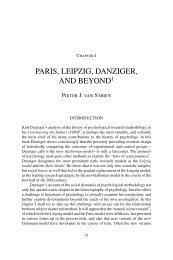The positivist repudiation of Wundt - Kurt Danziger
The positivist repudiation of Wundt - Kurt Danziger
The positivist repudiation of Wundt - Kurt Danziger
Create successful ePaper yourself
Turn your PDF publications into a flip-book with our unique Google optimized e-Paper software.
THE POSITIVIST REPUDIATION OF WUNDT 225<br />
science in terms <strong>of</strong> the satisfaction it gave to its practitioners and a small circle <strong>of</strong><br />
cognoscenti, the scientific equivalent <strong>of</strong> l’art pour l’art. <strong>The</strong> other, and far more popular,<br />
alternative was to justify science in terms <strong>of</strong> its practical usefulness. Both themes are ac-<br />
tually to be found in Mach’s writings, although, understandably, the public emphasis on<br />
the theme <strong>of</strong> practical usefulness has always far outweighed the other theme. Positivism<br />
has been the favorite philosophy <strong>of</strong> those who wished to justify science in terms <strong>of</strong> its<br />
usefulness for achieving established social goals. However, for many individual psy-<br />
chologists it also proved to be a convenient philosophy for reconciling a public justifica-<br />
tion <strong>of</strong> scientific activity in terms <strong>of</strong> social usefulness with a private justification in terms<br />
<strong>of</strong> personal satisfaction, a pattern that has been greatly encouraged by the internal struc-<br />
ture and the external relationships <strong>of</strong> psychology as a pr<strong>of</strong>ession.88<br />
It was the pr<strong>of</strong>essionalization <strong>of</strong> psychology that also completed the <strong>repudiation</strong> <strong>of</strong><br />
<strong>Wundt</strong> which had been taken such a long way by the first generation <strong>of</strong> Machian psy-<br />
chologists. <strong>Wundt</strong> strongly opposed that pr<strong>of</strong>essionalization,*e which hardly helped to<br />
persuade the younger men that hi Is fundamental attitudes were compatible with their<br />
concerns. He counselled extreme caution in the face <strong>of</strong> pressures to turn psychology into<br />
an applied science. He perceived, correctly, as it turned out, that the predominance <strong>of</strong><br />
practical interests would have a decisive influence on the methods, the goals, and the con-<br />
cepts <strong>of</strong> the discipline.g0 As regards methods, they would become more crude so that they<br />
might be used by unsophisticated technicians working in circumscribed settings. <strong>The</strong><br />
social institutions within which psychology was applied would impose their own biases on<br />
the subject; for example, psychology in education would be pushed into intellectualistic<br />
problem formulations and away from the dynamic bias <strong>of</strong> <strong>Wundt</strong>’s voluntarism. Finally,<br />
psychological concepts would become defined in ways narrowly determined by the prac-<br />
tical context <strong>of</strong> their application, and here <strong>Wundt</strong> pointed to the example <strong>of</strong> the new<br />
work on intelligence which seemed to him to involve a revival <strong>of</strong> faculty psychology.<br />
Hardly anyone listened to him by now. <strong>Wundt</strong> and his philosophy were clearly out <strong>of</strong> step<br />
with the way psychology was going.<br />
It is true that this was largely attributable to the fact that the world <strong>of</strong> the twentieth<br />
century suggested tasks to which he could not respond and created interests with which<br />
he could not sympathize. At the same time, it must be recognized that his system had<br />
been a failure, even on its own terms. Had his achievement been more convincing, his<br />
<strong>repudiation</strong> might not have proceeded quite so smoothly. His attempt to retain a place in<br />
psychology for the concept <strong>of</strong> value led, in practice, to a schematism that probably<br />
reminded not only Max Weber <strong>of</strong> the nineteenth-century faith in progress. His insistence<br />
on the dynamic foundation <strong>of</strong> psychological phenomena, which he called his “volun-<br />
tarism,” was not supported by concrete research on drives and motives, although ver-<br />
bally he stressed their importance. His notion <strong>of</strong> psychological analysis, although sup-<br />
posedly subordinated to his synthetic concepts, was not intrinsically determined by these<br />
concepts, thus leading to a number <strong>of</strong> inconsistencies. Most damaging, however, was his<br />
failure to endow his concept <strong>of</strong> psychic causality with the kind <strong>of</strong> content that might open<br />
up new perspectives for others. <strong>The</strong> principles <strong>of</strong> psychic causality which he enumerated<br />
remain rather empty abstractions. In his determination to avoid the errors <strong>of</strong> the<br />
associationists, who had mistaken logical relationships for psychological relationships,<br />
he did not recognize that the notion <strong>of</strong> psychic causality was doomed to sterility unless<br />
linked to categories <strong>of</strong> subjective meaning.<br />
<strong>The</strong> idea <strong>of</strong> psychic causality was reformulated in various ways by a number <strong>of</strong><br />
twentieth-century psychologists who stood outside the <strong>positivist</strong> mainstream. <strong>The</strong> princi-





